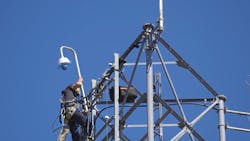PG&E's Wildfire Resilience Work: A Multi-Layered Approach
Pacific Gas and Electric Company (PG&E) recently shared details of its wildfire resilience work—ranging from undergrounding and system upgrades to AI-driven situational awareness—demonstrating a layered, proactive approach to fire prevention and system safety.
At its Applied Technology Services lab, PG&E highlighted how a combination of engineering upgrades and emerging technologies is being used across high fire-risk areas. These efforts have already played a role in avoiding major wildfire incidents in 2023 and 2024.
Key Mitigation Strategies Include:
-
Undergrounding Powerlines: PG&E has undergrounded more than 900 miles of distribution lines in high fire-risk areas and aims to reach 1,600 miles by 2026, eliminating ignition potential from above-ground conductors.
-
Overhead System Hardening: Strengthened poles and covered conductors have been deployed across 1,430 miles since 2018, with a targeted 67% reduction in ignition risk for treated areas.
-
Advanced Situational Awareness: A network of nearly 1,600 weather stations and more than 650 AI-enabled wildfire cameras provides real-time data and early alerts for wildfire conditions.
-
Enhanced Powerline Safety Settings (EPSS): Automated shutoff technology de-energizes lines within a fraction of a second when hazards are detected. EPSS has led to a 65% drop in reportable ignitions in high-risk areas, with shorter outages and minimal customer disruption.
-
Vegetation Management: Using a risk-informed, data-driven approach, PG&E has addressed over 960,000 trees in its territory in the last five years to reduce contact risk with energized equipment.
-
Drone-Based Inspections: Aerial inspections continue to offer efficient asset monitoring in remote or fire-prone terrain.
-
Public Safety Power Shutoffs: Still considered a last-resort tool, PSPS events are guided by detailed weather modeling and circuit-specific risk assessments.
As part of its longer-term strategy, PG&E also participates in national and global innovation efforts. The company is a co-title sponsor of the XPRIZE Wildfire initiative, which aims to accelerate technologies that detect and suppress wildfires in their earliest stages. The competition includes autonomous suppression demonstrations and high-resolution fire behavior modeling, with local teams like Ember Guard and Rain advancing scalable AI and drone-based response systems.
For utilities facing similar wildfire threats, PG&E's multi-layered approach offers a case study in integrating traditional grid hardening with next-generation technologies.
